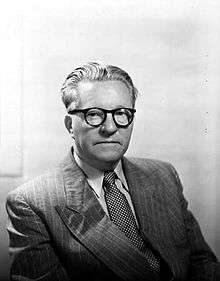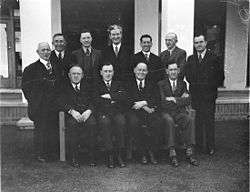Eddie Ward
| The Honourable Eddie Ward | |
|---|---|
 | |
| Member of the Australian Parliament for East Sydney | |
|
In office 7 March 1931 – 19 December 1931 | |
| Preceded by | John West |
| Succeeded by | John Clasby |
|
In office 6 February 1932 – 31 July 1963 | |
| Preceded by | John Clasby |
| Succeeded by | Len Devine |
| Personal details | |
| Born |
7 March 1899 Darlington, New South Wales |
| Died |
31 July 1963 (aged 64) Darlinghurst, New South Wales |
| Nationality | Australian |
| Political party |
Lang Labor (1931–36) Labor (1936–63) |
| Occupation | Unionist |
Edward John "Eddie" Ward (7 March 1899 – 31 July 1963), Australian politician, was an Australian Labor Party member of the Australian House of Representatives from 1931 until his death, excepting a short six-and-a-half week break from December 1931 to February 1932.
Biography
Born and raised in Darlington, Sydney, Ward attended St Francis de Sales, Cleveland Street, and later Crown Street Public School, before leaving school at 14. Ward spent time variously as a labourer, boilermaker, tarpaulin maker, tramways worker and prize boxer before his political career. He was actively involved in the Great Strike of 1917 which would affect his employment opportunities for the next decade.
Ward was first elected to the House of Representatives at the 1931 East Sydney by-election in the midst of the Great Depression and the rise to prominence of Australian Labor Party New South Wales Premier Jack Lang, whose policies for dealing with the depression were considered radically left wing. Ward was a Lang supporter and gained notoriety soon after his election when Prime Minister and ALP leader James Scullin refused to allow Ward into the ALP caucus. In response, Ward joined Jack Beasley and three other Lang supporters in forming the "Australian Labor Party (NSW)," popularly known as "Lang Labor." Eight months later, Ward and the other Lang Labor members voted with the opposition on a no-confidence motion to bring down the Scullin government.[1]
Ward lost his seat later that year to the UAP at the federal election as the Labor vote was split between Ward and the official ALP candidate. On the second count, just over half of the official Labor candidate's preferences flowed to UAP candidate John Clasby, allowing Clasby to win. As luck would have it, Clasby died less than a month after the election before he even took his seat in parliament. At the ensuing February 1932 by-election, Ward reclaimed the seat, again as a Lang Labor candidate.
Ward remained in Lang Labor until 1936, when he returned to the ALP. Nevertheless, he would continue to have a prickly relationship with many of his Labor colleagues for the rest of his life.
One such issue that set Ward apart from his parliamentary colleagues was his opposition to any form of defence spending. During the 1936 budget debate, he argued that any funding earmarked for defence would be better spent on welfare and unemployment relief. In reference to a move to increase the size of the Royal Australian Navy, Ward said:
I wonder if such vessels are really needed for the defence of Australia, or whether they are not required for the purpose of helping other peoples defend rich possessions in other parts of the world.
Although in retrospect, Ward's opposition to defence spending appears foolhardy in view of what would occur in the following years, his stance did reflect the thinking of many Australians at the time.

While in opposition during the early years of World War II, Ward was leaked evidence of the 'Brisbane Line' plan, the Menzies government's decision that, in the event of enemy invasion, Australia would have been defended by the concentration of Australian military forces on a line drawn from Brisbane to Adelaide, meaning that large tracts of Australia would have been abandoned to the Japanese. In 1941, Ward entered the ministry of new Prime Minister John Curtin.
Ward served as Minister for Labour and National Service before being moved to Minister for Transport and Minister for External Territories in 1943, considered a demotion – Curtin pointed out that "the Japs [Japanese] have got the External Territories and the Army's got the transport", leaving Ward with little to administer. Even before then, however, Ward barely concealed his hostility to Curtin; for instance, he once accused Curtin of "putting young men into the slaughterhouse, although thirty years ago you would not go into it yourself".[1]
Following the death of Curtin in 1945, Ward nominated for leadership of the Labor Party, which would have resulted in him becoming Prime Minister, but lost to Ben Chifley. Ward would continue to harbour leadership aspirations throughout the rest of his career. Rarely, if ever, did he have a friendly working relationship with any ALP leader.
After World War II, Ward remained in the spotlight. He vigorously opposed the Bretton Woods system and Australia joining the International Monetary Fund and the International Bank for Reconstruction (later one of five institutions in the World Bank Group), because he believed international financiers were responsible for the Depression in Australia during the 1930s. Ward argued that signing Bretton Woods would "enthrone a World Dictatorship of private finance, more complete and terrible than any Hitlerite dream"; destroy Australian democracy; pervert and paganise Christian ideals; and endanger world peace. It was outbursts like these that would continue to stymie his leadership ambitions within the Labor Party.
He was famous for sardonically "welcoming" Menzies back to Australia after his many three-month absences in England at the beginning of each parliamentary year. Ward was the subject of a parliamentary outburst by Menzies (who had apparently drunk too much) during a discussion of the Communist Party Dissolution Bill. Ward often criticised Menzies and in 1944, had called him "a posturing individual with the scowl of a Mussolini, the bombast of a Hitler and the physical proportions of a Göring".[2]
His highest contempt, however, was for those who he considered had betrayed the working class. He refused an invitation to a function celebrating Labor-turned-Nationalist Prime Minister Billy Hughes' 50 years in parliament, saying "I don't eat cheese", a reference to Labor tradition whereby any one leaving the ALP is considered a "rat".[1]
Following the 1946 election, Ward nominated for Deputy Leader of the Labor Party but was beaten by Herbert Vere Evatt. Setting a trend, he was again nominated for deputy leader in 1951, coming third behind Arthur Calwell and the comparatively little-known Percy Clarey; and in 1960, when he lost narrowly to future Prime Minister Gough Whitlam, despite getting the support of newly elected leader Arthur Calwell who had disliked Whitlam. In 1961, upon the defeat of Earle Page, Ward became the Father of the Australian House of Representatives. However, with the end of his leadership aspirations and the onset of advanced atherosclerosis, diabetes mellitus and heart disease, Ward was losing political importance although he was still seen as an elder statesman of the Labor Party.[1] The ALP had narrowly lost the 1961 election under the leadership of Arthur Calwell. Calwell would later write in his autobiography that he believed that the party could have won the 1961 election if Ward had been his deputy instead of Whitlam.[3] He was still serving as Member for East Sydney when he died at St Vincent's Hospital, Darlinghurst of a heart attack. Asked when he knew that his health was failing, he said it was when he "took a swing at Gough Whitlam, and missed." He was given a state funeral and buried with Catholic rites in Randwick Cemetery.[1]
Arthur Calwell eulogised Ward as an irrepressible fighter and unrelenting hater whilst Curtin had dismissed him as a "bloody ratbag." The journalist Arthur Hoyle believed that many of Ward's generation believed that he was 'most authentic voice that the working class in Australia has had'.[1]
Notes
- 1 2 3 4 5 6 McMullin, Ross (2002). "Ward, Edward John (Eddie) (1899–1963)". Australian Dictionary of Biography. Canberra: Australian National University. Retrieved 6 November 2007.
- ↑ http://parlinfo.aph.gov.au/parlInfo/search/display/display.w3p;query=Id%3A%22hansard80%2Fhansardr80%2F1944-02-24%2F0098%22
- ↑ Calwell, Arthur A. (1978). Be just and fear not. Rigby. ISBN 07270 0942 7.
References
- Eddie Ward: Firebrand of East Sydney, Elwyn Spratt, Rigby, 1965
- Eddie Ward – The Truest Labor Man, Arthur Hoyle, SP, Canberra, 1994
External links
| Wikimedia Commons has media related to Eddie Ward (Australian politician). |
| Political offices | ||
|---|---|---|
| Preceded by Harold Holt |
Minister for Labour and National Service 1941–1943 |
Succeeded by Jack Holloway |
| Preceded by George Lawson |
Minister for Transport 1943–1949 |
Succeeded by Howard Beale |
| Preceded by James Fraser |
Minister for External Territories 1943–1949 |
Succeeded by Percy Spender |
| Parliament of Australia | ||
| Preceded by John West |
Member for East Sydney 1931 |
Succeeded by John Clasby |
| Preceded by John Clasby |
Member for East Sydney 1932–1963 |
Succeeded by Len Devine |
| Preceded by Earle Page |
Father of the House of Representatives 1961–1963 |
Succeeded by Robert Menzies/Joseph Clark/ Sir John McEwen |